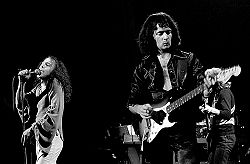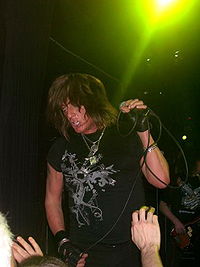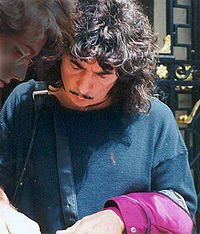Rainbow (band)
| Rainbow | |
|---|---|
 Ronnie James Dio and Ritchie Blackmore in Norway, 1977 |
|
| Background information | |
| Also known as | Ritchie Blackmore's Rainbow Blackmore's Rainbow |
| Origin | England |
| Genres | Hard rock, heavy metal, blues-rock |
| Years active | 1975–1984 1994–1997 |
| Labels | Polydor, BMG |
| Associated acts | Deep Purple, Elf, Bible Black, Black Sabbath, Alcatrazz, Fandango, Dio, The Michael Schenker Group, Yngwie Malmsteen's Rising Force, Blackmore's Night, Over the Rainbow |
| Past members | |
| See: Member history | |
Rainbow (also known as Ritchie Blackmore's Rainbow or Blackmore's Rainbow) were an English rock band, controlled by former Deep Purple guitarist Ritchie Blackmore from 1975 to 1984 and 1994 to 1997. It was originally established with former Elf members, though over the years Rainbow went through many lineup changes. In addition to lead singers Ronnie James Dio, Graham Bonnet, Joe Lynn Turner and Doogie White, the project consisted of numerous backing musicians. The music started out as mostly the mystical themes and epic compositions, yet went in a more streamlined commercial style following original singer's departure from the group.[1]
Rainbow was ranked #90 on VH1's 100 Greatest Artists of Hard Rock.[2]
Contents |
History
Early years
In 1974, Blackmore became infuriated at the funk/soul (or as Blackmore called it, "shoeshine music") elements being introduced to Deep Purple by David Coverdale and Glenn Hughes, as well as with the rejection from his bandmates of his suggestion to record a cover for inclusion on Stormbringer. Blackmore had originally intended to record Steve Hammond's "Black Sheep of the Family", a song recorded by the band Quatermass, as a solo single to express that his ideas were being suppressed in Deep Purple. During recent US tours, Deep Purple's support band had been Elf, and Ritchie had been impressed by Elf's singer, Ronnie James Dio. Blackmore and Dio found they had such a creative rapport that a full album's worth of music was soon composed, and they recorded it with Elf as a session band. Emboldened by the experience, Blackmore decided to leave Deep Purple and form his own band around Elf, effectively taking it over minus their guitarist and renaming it Rainbow. The name of the band was inspired by the Rainbow Bar and Grill in Hollywood that catered to rock stars, groupies and rock enthusiasts.[3]

Rainbow's debut album, Ritchie Blackmore's Rainbow, was released in 1975 and featured the minor hit "Man on the Silver Mountain".
Rainbow's music was different from Deep Purple's. The music was more directly inspired by classical music, and Dio wrote lyrics about medieval themes. Dio possessed a versatile vocal range capable of singing both hard rock and lighter ballads. Although Dio never played a musical instrument on any Rainbow album, he is credited with writing and arranging the music with Blackmore, in addition to writing all the lyrics himself.[5][6][7]
Blackmore fired everybody except Dio shortly after the album was recorded due to Gary Driscoll's R&B style of drumming and funky bass playing of Craig Gruber. Micky Lee Soule quit due to Blackmore's decisions and an opportunity to play in the Ian Gillan Band, and Blackmore recruited Cozy Powell, Jeff Beck's drummer, bassist Jimmy Bain, and American keyboard player Tony Carey. This lineup went on to record the next album Rising. This line-up also commenced the first world tour for the band, with the first US dates in late 1975.
By the time of the European dates in the summer of 1976, Rainbow's reputation as a blistering live act was already established. Blackmore subsequently decided that Bain was substandard and fired him in January 1977. Bain was later asked to play bass in Dio's solo career. The same fate befell Carey shortly after. Tony Carey later formed a solo career in 1983. However, Blackmore had difficulty finding replacements he liked. On keyboards, after auditioning several high profile artists, including Vanilla Fudge's Mark Stein, Procol Harum's Matthew Fisher and ex-Curved Air and Roxy Music man Eddie Jobson, Blackmore finally selected Canadian David Stone, from the little-known band Symphonic Slam. For a bass player, Blackmore originally chose Mark Clarke from the band Tempest, but once in the studio for the next album, Long Live Rock 'n' Roll, Blackmore disliked his playing so much that he fired Clarke on the spot and played bass himself on all but four songs: "Long Live Rock N' Roll", "Gates of Babylon", "Kill the King", and "Sensitive To Light". Bassist Bob Daisley was hired to record these tracks.
After the release and extensive world tour in 1977–78, Blackmore decided that he wanted to take the band in a new commercial direction away from the "sword and sorcery" theme and hired former (now current) Deep Purple bassist Roger Glover as a producer and songwriter[8]. Glover had almost completely quit playing the bass, and had devoted the latter part of his career to producing, creating hits for such bands as Judas Priest, Nazareth and Status Quo. This move was somewhat surprising, as Blackmore had instigated the sacking of Glover from Deep Purple in 1973. Dio did not agree with this change and left Rainbow. He would go on to replace Ozzy Osbourne as the lead singer in Black Sabbath. (Coincidentally, Daisley, Powell and future Rainbow drummer Bobby Rondinelli also played with Black Sabbath at various times.) Dio would later form his own self-titled band with Jimmy Bain. Dio died on May 16, 2010 from stomach cancer.
Commercial success
Blackmore attempted to replace Dio with Ian Gillan, but Gillan turned him down. After a series of auditions, former vocalist/guitarist of The Marbles, Graham Bonnet was recruited instead. Gillan would replace Dio later in his career, in Black Sabbath. Powell stayed, but Daisley and Stone were both fired, the latter being replaced by keyboardist Don Airey (later in Deep Purple). The band was, at first, auditioning for bass players, but, at Cozy Powell's suggestion, it was then agreed that Roger Glover would go back to his old instrument and join the band as a full-time musician, and not only, as originally intended, as a producer and songwriter.[9] The first album from the new lineup, Down to Earth, featured the band's first major singles chart successes, "All Night Long" and the Russ Ballard-penned "Since You Been Gone". In 1980, the band headlined the inaugural 'Monsters of Rock' festival at Castle Donington in England. However, this was Powell's last Rainbow gig, as he had already given his notice to quit, disliking Blackmore's increasingly pop metal direction. He would go on to play for Michael Schenker, Whitesnake (founded by Blackmore's former Deep Purple bandmate David Coverdale) and Black Sabbath. Bonnet was fired the night Powell quit due to a drunken performance. Soon after, he would also join the Michael Schenker Group, and later pursued a solo career. Ironically, Bonnet was fired from MSG due to similar problems as with Rainbow.

For the next album, Bonnet and Powell were replaced by Americans Joe Lynn Turner and Bobby Rondinelli, respectively. The title track from the album, Difficult to Cure, was a version of Beethoven's Ninth Symphony. The album also contained the guitar piece, "Maybe Next Time". After the supporting tour, Don Airey then quit over musical direction and was replaced on keyboards by David Rosenthal.
The band attained significant airplay on Album-oriented rock radio stations in the US with the track "Jealous Lover", reaching #13 on Billboard Magazine's Rock Tracks chart, which tracked AOR airplay. Originally issued as the B-side to "Can't Happen Here", "Jealous Lover" subsequently became the title track to an EP issued in the US that featured very similar cover art to "Difficult to Cure".
Rainbow's next full length studio album was Straight Between the Eyes. The album was more cohesive than Difficult to Cure, and had more success in the United States. The band, however, was alienating some of its earlier fans with its more AOR sound.[10] The single, "Stone Cold", was a ballad that had some chart success (#1 on Billboard Magazine's Rock Tracks chart) and the video of which received heavy airplay on MTV. The successful supporting tour skipped the UK completely and focused on the American market. A date in San Antonio, Texas on this tour was filmed, and the resulting "Live Between the Eyes" also received repeated showings on MTV.
Bent Out of Shape saw drummer Rondinelli fired in favour of Chuck Burgi. The album featured the single "Street of Dreams". According to Blackmore's biography on his official website, the song's video was banned by MTV for its supposedly controversial hypnotic video clip.[11] However, Dr. Thomas Radecki of the National Coalition on Television Violence criticized MTV for airing the video, which would contradict Blackmore's claim.[12] The resulting tour saw Rainbow return to the UK, and also to Japan in March 1984 where the band performed 'Difficult to Cure' with a full orchestra. The concert was also filmed.
Dissolution and temporary revival

Blackmore and Glover's management Thames Talent made a resounding offer to reform Deep Purple MKII. By April 1984, Rainbow was disbanded. A final Rainbow album, Finyl Vinyl, was pieced together from live tracks and B-sides of singles. The album contained the instrumental "Weiss Heim", widely available for the first time. In 1989 Blackmore recruited ex-Rainbow singer Joe Lynn Turner as Deep Purple singer. This line-up produced a very typical Rainbow-sounding album, Slaves and Masters, which instantly raised negative criticism among Deep Purple fans. Blackmore was enormously dissatisfied, and left Deep Purple in 1993 to form a new Rainbow with all-new members. The band released Stranger in Us All in 1995, and embarked on a lengthy world tour.
The tour proved very successful, and a show in Germany was professionally filmed by Rockpalast. It has never officially been released, but has been heavily bootlegged (and considered by many collectors to be the best Rainbow bootleg of the era). The live shows featured frequent changes in set lists, and musical improvisations that proved popular with bootleggers and many shows are still traded over a decade later.
However, fed up with stadium rock, Blackmore turned his attention to Renaissance and medieval music, a lifelong interest of his. Rainbow was put on hold once again, after playing its final concert in Esbjerg, Denmark in 1997. Blackmore, together with his partner Candice Night as vocalist, then formed the Renaissance-influenced Blackmore's Night who, as of 2010, are still recording albums and performing small intimate tours – completely in contrast to Rainbow's mammoth stadium shows.
In late 1997, Cozy Powell approached Ritchie Blackmore to see if he would be interested in reforming the Rising line-up of Rainbow. Due to everyone's prior commitments, this proposed reunion was intended to last for just one tour, and by early 1998, both Dio and Blackmore had almost given the project the green light. However, Powell's death in April 1998 brought about the demise of the long-anticipated reunion. In the decade since, many other rumours have been in various web sources of a future Dio/Blackmore Rainbow project, but both men have always quickly dispelled these rumours as having no basis in fact, and Dio's death in 2010 would make such a reunion impossible.
Rainbow songs after 1997
Many Rainbow songs have been performed live by former members of the band since the group's split in 1984 and then in 1997, particularly former frontmen, Ronnie James Dio, Graham Bonnet and Joe Lynn Turner in recent years. Also, Don Airey often plays 1979-1981 era songs during his solo shows. Blackmore's Night occasionaly performs one or two Rainbow songs live.
In 2002-2004 the Hughes Turner Project played a number of Rainbow songs at their concerts. On 9 August 2007 Joe Lynn Turner and Graham Bonnet played a tribute to Rainbow show in Helsinki, Finland. The concert consisted of songs from the 1979-1983 era.
Rainbow fans would be also interested in the White Noise DVD (featuring former Rainbow singer Doogie White) titled "In The Hall Of The Mountain King" (recorded in 2004 and released in 2005). It is the only release by the band White Noise. This was a DVD filmed on their support stint with progressive rock band Uriah Heep. The show consisted of mostly Rainbow songs from their 1995 album Stranger in Us All but featured arrangements of other songs including Mostly Autumn's 'Never the Rainbow'.
In 2009, Joe Lynn Turner, Bobby Rondinelli, Greg Smith and Tony Carey created Over The Rainbow with Jürgen Blackmore (Ritchie's son) as the guitarist. Over The Rainbow perform songs from every era of the band's history.
Band members
- Core member
- Ritchie Blackmore – guitar (1975–1984, 1994–1997)
- Other members
|
|
Discography
- Ritchie Blackmore's Rainbow (1975)
- Rising (1976)
- On Stage (1977)
- Long Live Rock 'n' Roll (1978)
- Down to Earth (1979)
- Difficult to Cure (1981)
- The Best of Rainbow (1981)
- Straight Between the Eyes (1982)
- Bent Out Of Shape (1983)
- Finyl Vinyl (1986)
- Stranger in Us All (1995)
References
- ↑ Rivadavia, Eduardo. "Rainbow". Allmusic. http://allmusic.com/cg/amg.dll?p=amg&sql=11:wifqxqr5ldje. Retrieved 2010-07-10.
- ↑ http://rateyourmusic.com/list/CurtisLoew/vh1s_100_greatest_artists_of_hard_rock/
- ↑ "Rainbow - 1975-1978". Ronnie James Dio (Official Site). http://ronniejamesdio.com/disc_rainbow.asp. Retrieved 2009-06-24.
- ↑ Robinson, Simon (1977). Rainbow Live in Munich 1977 (liner notes). Eagle Rock Entertainment Ltd..
- ↑ Ritchie Blackmore's Rainbow. CD liner notes: Polydor Records.
- ↑ Rainbow Rising. CD liner notes: Polydor Records.
- ↑ Long Live Rock 'N' Roll. CD liner notes: Polydor Records.
- ↑ Davies, Roy (2002). Rainbow Rising: The Story of Ritchie Blackmore's Rainbow. Helter Skelter Publishing.
- ↑ "Roger Glover. 1973-2006 History". http://www.deep-purple.net/tree/glover/roger-glover.htm. Retrieved 2009-09-23.
- ↑ Rivadavia, Eduardo. "Rainbow". Allmusic. http://allmusic.com/cg/amg.dll?p=amg&sql=11:wifqxqr5ldje. Retrieved 2010-07-08.
- ↑ http://www.blackmoresnight.com/ritchie_bio.html
- ↑ Denisoff, R. Serge (1988). "MTV: Some People Just Don't Get It". Inside MTV. Transaction. p. 284. ISBN 9780887388644. http://books.google.com/books?id=GlAecBkObiEC&lpg=PA284&ots=NTpVt1bpBJ&dq=%22street%20of%20dreams%22%20banned%20mtv&pg=PA284#v=onepage&q=%22street%20of%20dreams%22%20banned%20mtv&f=false. Retrieved October 13, 2009. "'Street of Dreams' by Rainbow has a psychiatrist dominating a man through hypnosis intermixed with male-female violent fantasies including a bound and gagged woman."
Bibliography
- Roy Davies, Rainbow Rising - The Story of Ritchie Blackmore's Rainbow (Helter Skelter, 2002)
- Martin Popoff, Rainbow - English Castle Magic (Metal Blade, 2005)
- Jerry Bloom, Black Knight - Ritchie Blackmore (Omnibus Press, 2006)
- Jerry Bloom, Long Live Rock 'n' Roll Story (Wymer Publishing, 2009)
External links
- The Rainbow Fanclan Legacy
- Rainbow (band) at Allmusic
|
||||||||||||||||||||||||||